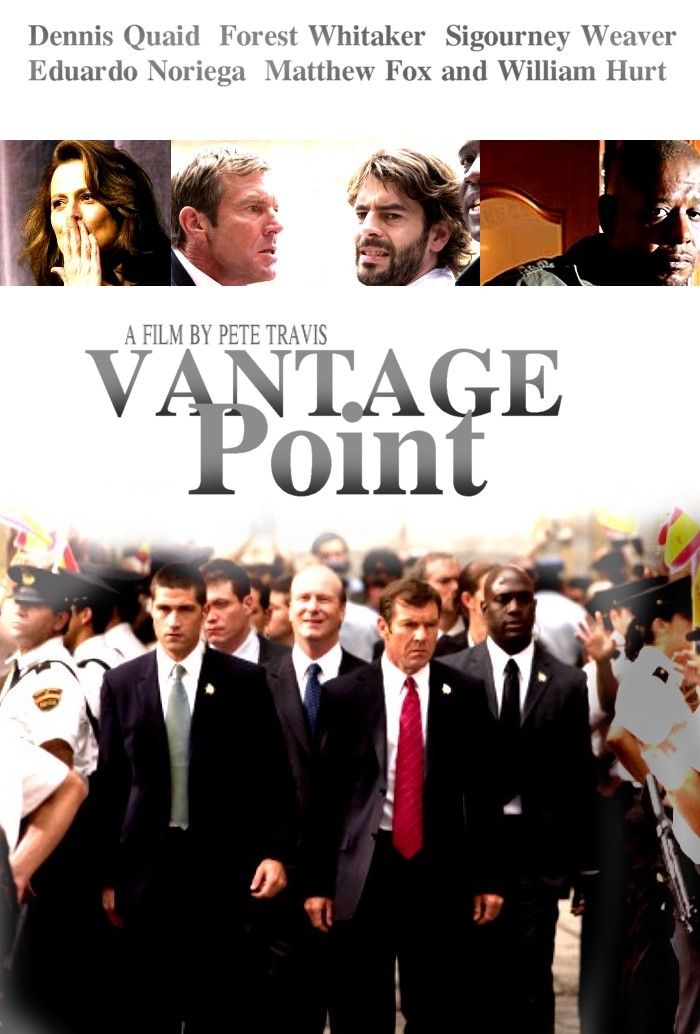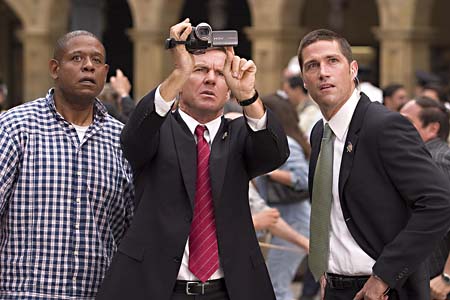

Secret Service agents are trained to be vigilant, to be perceptive, and if necessary to take a bullet for the President. Agent Thomas Barnes (Dennis Quaid) has been one of the best and is assigned to the team protecting the President as he attends a welcome in Salamanca, Spain, at the beginning of an anti-terrorist summit of world leaders. With crowds of protestors and spectators, journalists and TV crew, the police and secret service are on full alert. Yet, something is destined to happen.
Vantage Point is a taut thriller that defies exposition with revealing too many spoilers. What starts out as a simple thriller, becomes a fascinating yet exciting view of events from different perspectives. The catch in Vantage Point is that we see the same events over and over again, from the view points of different people, strangers, and each time we see something new. It is a Bourne Ultimatum crossed with Memento.
Recent movies, like Before the Devil Knows You're Dead, have used flashbacks and non-linear narrative but not as the main plot device. Vantage Point uses it consistently and effectively to draw the tension tighter and tighter.
 The first view of the events is from the inside of a TV production trailer, with Rex Brooks (Sigourney Weaver) ruling her crowded roost. Watching her wall of monitors, directing the ubiquitous cameras, she sees everything that is happening as the President's motorcade approaches the plaza where he will be welcomed by the mayor. Yet, seeing everything she misses what is really happening. When President Ashton (William Hurt) arrives at the podium two shots ring out and he is taken down. When her on-site reporter is called on to give a first-hand narration, she is in tears. This has become personal. When bombs start exploding, chaos ensues, and things get even more personal and shocking.
The first view of the events is from the inside of a TV production trailer, with Rex Brooks (Sigourney Weaver) ruling her crowded roost. Watching her wall of monitors, directing the ubiquitous cameras, she sees everything that is happening as the President's motorcade approaches the plaza where he will be welcomed by the mayor. Yet, seeing everything she misses what is really happening. When President Ashton (William Hurt) arrives at the podium two shots ring out and he is taken down. When her on-site reporter is called on to give a first-hand narration, she is in tears. This has become personal. When bombs start exploding, chaos ensues, and things get even more personal and shocking. Vantage Point breaks off sequences abruptly, often leaving the viewer in a mini-cliff hanger. It returns to the narrative at noon each time. Agent Barnes' view comes next. He has actually taken a bullet for the president and this is his first return to action. Visibly nervous, he is a shaken man offered a second chance. A big question he faces is how he will perform. In life, we often get thrown, and face a choice of how to respond. Will we get back in the saddle, even in the face of the fear of being thrown again? Will we even be offered the chance of redemption?
Vantage Point breaks off sequences abruptly, often leaving the viewer in a mini-cliff hanger. It returns to the narrative at noon each time. Agent Barnes' view comes next. He has actually taken a bullet for the president and this is his first return to action. Visibly nervous, he is a shaken man offered a second chance. A big question he faces is how he will perform. In life, we often get thrown, and face a choice of how to respond. Will we get back in the saddle, even in the face of the fear of being thrown again? Will we even be offered the chance of redemption? With each new take on the unfolding events we learn something new. We see through the "eyes" of Forest Whittaker's video camera. He plays a vacationing American, estranged from a wife and kids. In the midst of the Spaniards in the plaza, meeting a little girl, Anna, and slap-bang in the middle of a bomb-scene and police chase, he comes to recognize the value of life and relationships.
With each new take on the unfolding events we learn something new. We see through the "eyes" of Forest Whittaker's video camera. He plays a vacationing American, estranged from a wife and kids. In the midst of the Spaniards in the plaza, meeting a little girl, Anna, and slap-bang in the middle of a bomb-scene and police chase, he comes to recognize the value of life and relationships.At one point, one of the bombers says, "the beauty of American arrogance is that they can't imagine a world where they're not a step ahead." This hits home. We Americans often think we can build our plans and contingency plans, and in this way control the eventual outcome desired. Yet this is arrogant thinking. We fool ourselves. We are not really in control. That is the realm of the sovereign God. The opposite attitude is humility. We need to approach life the way James says: "Now listen, you who say, 'Today or tomorrow we will go to this or that city, spend a year there, carry on business and make money.' Why, you do not even know what will happen tomorrow" (Jas 4:13-14).
The strength of Vantage Point is its unique viewpoint, not necessarily its acting. Dennis Quaid, so good in recent years in the two 2002 movies The Rookie and Far From Heaven, plays Agent "botox" Barnes -- with a frozen face. He has just one facial expression throughout. He is a shaky fallen hero made from granite. Forest Whitaker looks lost as tourist Howard Lewis. Only William Hurt conveys credibility in the person of the president.
Yet despite these acting flaws, Vantage Point is an entertaining and gripping movie. It packs in an exciting, but unbelievable extended car chase scene through the narrow Spanish streets, reminiscent of the small-car chases in both versions of The Italian Job. Throughout we see a complex conspiracy that captivates right to the very end where it makes sense, though leaving many questions unanswered -- as life leaves us without all the answers.
Vantage Point brings home the fact that often we may see but not actually see. We think we know what we are seeing, but it could be a misperception, even an illusion. We may feel we have all the facts, but in listening to others we may learn we are wrong. It reminds us that first-hand witnesses may appear to disagree, yet bring portions of the truth to the table. In combining them synergistically their sum can be greater than the whole. Some have written off the four gospels, or many parts of their writing, since they appear not to "agree" 100%. Yet, when witnesses agree completely they may have been coached in the same story. Different perspectives, as Matthew, Mark, Luke and John bring to the portrayal of the life of Jesus, offer rich dimensionality to truth.
Copyright ©2008, Martin Baggs

No comments:
Post a Comment